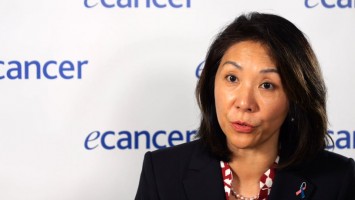The background of our study was that patients with relapsed and refractory AML have very poor outcomes and not a lot of options available to them. Many of them are old, are not eligible for intensive chemotherapy and are often not included into clinical trials. So hypomethylating agents as a form of epigenetic therapy has been described in the upfront setting for AML to have some benefit and the question here was what type of benefit can be derived from hypomethylating agents in the relapsed and refractory setting. At ASH actually last year we looked at hypomethylating agents in this setting in a multicentre retrospective study including twelve cancer centres from the United States and Europe and we looked at about 650 patients who received hypomethylating agents for relapsed and refractory AML. What we have observed is that about 16% have response and when they have a response they have a median overall survival of 20 months. So this year we asked for this patient cohort what are molecular predictors and what impact does that administration schedule have on response and survival.
What effect does it have?
We looked first at the administration schedule itself. It seemed it did not make a difference whether azacitidine or decitabine was given, so the type of agent did not have an impact. But the schedule that the agent was given on had an impact, in particular prolonged administration of decitabine on a ten day schedule was associated with improved response rates in a multivariate analysis. At the same time we looked at several mutations; we had enough mutational data for four mutations – FLT3, NPM1, C/EBPα and p53. We looked both for response and survival and did not detect an impact of those mutations on response and overall survival.
Did the change in schedule have any impact on adverse events?
We did not look in particular at adverse events. The only surrogate marker we looked at is whether patients stopped the agents early and that did not seem to happen. But we did not look at cytopenias or transfusions needed.
In terms of taking these lessons forward to clinical practice, how would you advise people working in the clinic who are maybe working with hypomethylating agents? Anything that they could be changing in their day to day practice?
Based on our analysis, what we would probably recommend is for patients who have relapsed and refractory AML and are not included into a clinical trial, which is the preferred way to go, is when they go on hypomethylating agents we would recommend that patients with low blast percentage and not highly proliferative disease go on hypomethylating agents and if they do so to go on a ten day schedule of decitabine. At the same time what is really going to pave the way for the future is to look at what type of novel agents can hypomethylating agents be combined with and there are actually several clinical trials right now on the way. We hope that our study looking at hypomethylating agents as monotherapy gives a comparison for those trials which are often done as single arm trials as a comparison to see how the combination works better.








